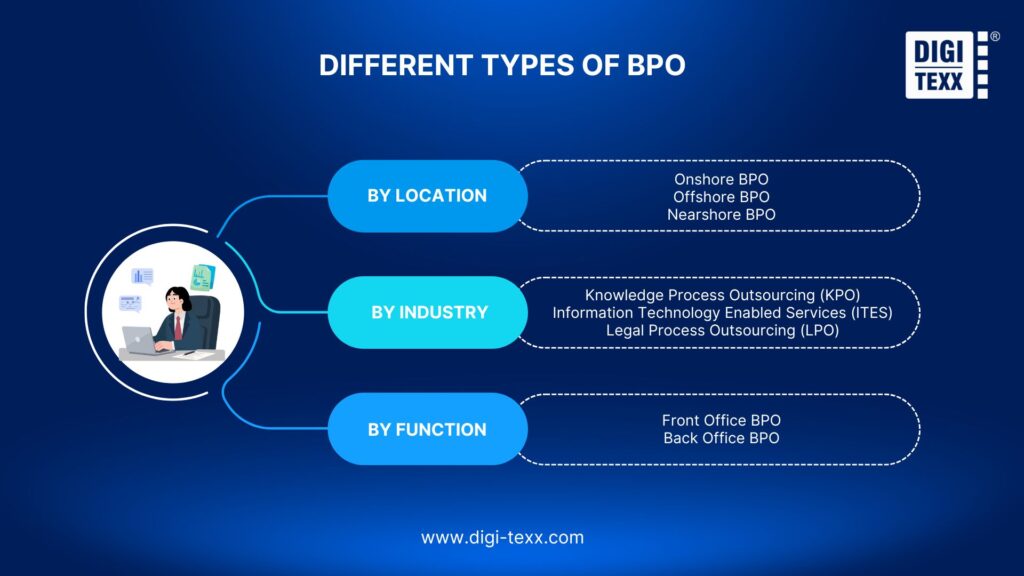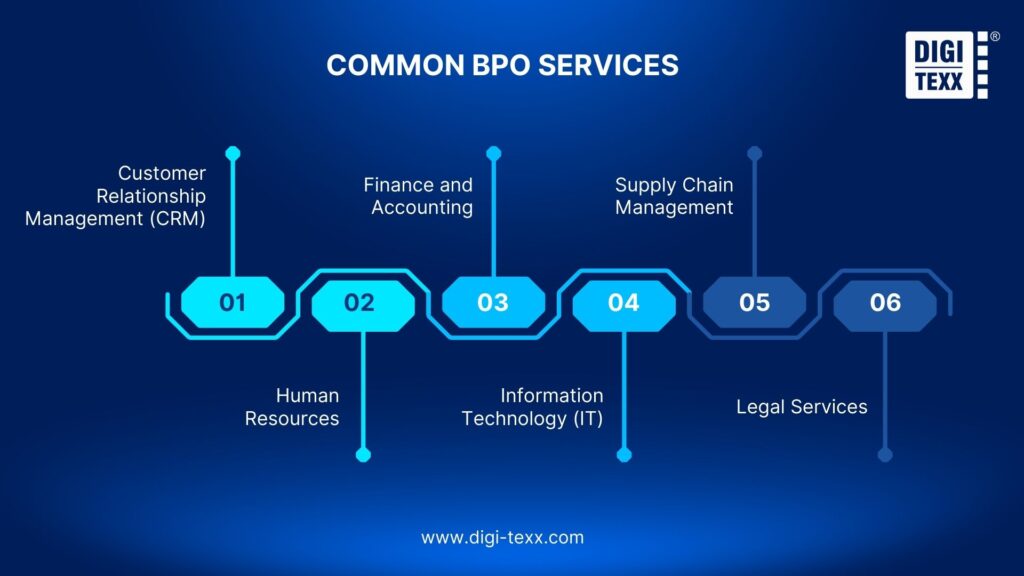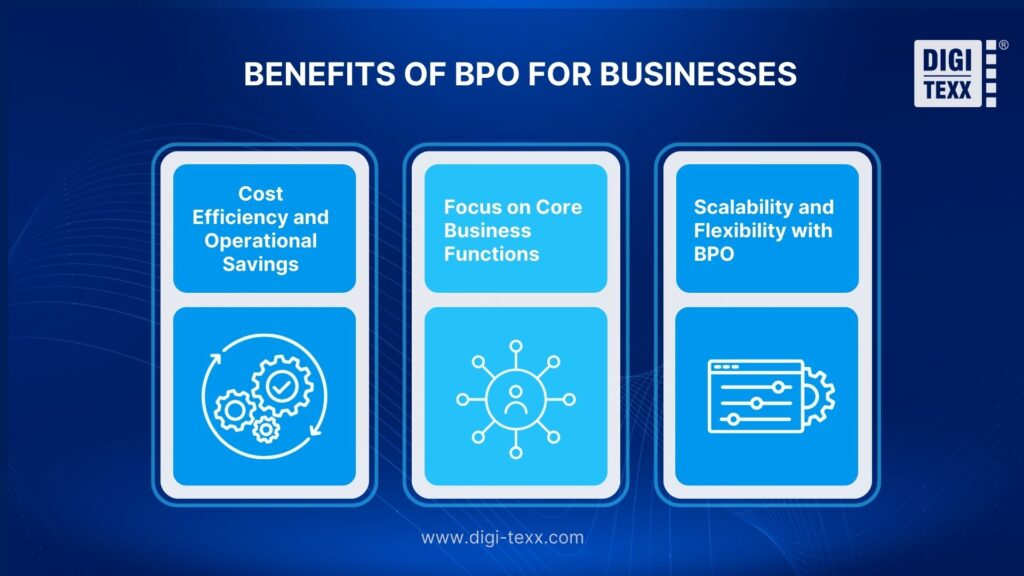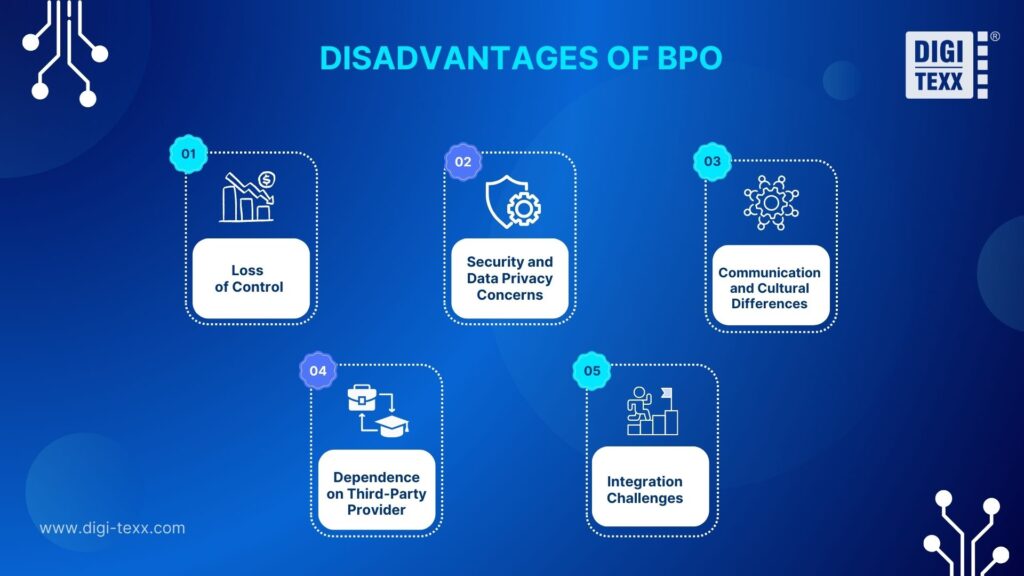BPO industry continues to evolve as businesses seek ways to improve efficiency, reduce costs, and focus on core functions. In this article, DIGI-TEXX explains what Business Process Outsourcing (BPO) is and how it works in practice. In simple terms, BPO involves hiring a third-party provider to handle specific business functions or processes, helping companies leverage external expertise while concentrating on their primary operations.

>>> See more:
- Top 10 Data Processing Software For Business 2026 – Best Tool Reviewed
- Business Process Automation Solutions: Benefits, Example & Service Company
What Is Business Process Outsourcing (BPO)?
Business Process Outsourcing is not just a trend, it’s a strategic decision made by organizations of all sizes to enhance operational efficiency and gain competitive advantage. By delegating tasks that are not central to the company’s core activities, businesses can tap into specialized skills and technology that may otherwise be unavailable or too expensive to maintain in-house.
The essence of BPO lies in its ability to allow organizations to focus on what they do best—whether it’s product innovation, customer relationship management, or market expansion—while entrusting non-core tasks, such as human resources, IT support, and accounting, to external experts. This outsourcing model reduces overhead costs, enhances service quality, and provides access to a broader talent pool.
Over the last two decades, globalization has fueled the rise of BPO. Companies now have the opportunity to engage with skilled labor across various regions of the world, enabling them to implement cost-effective solutions without compromising on quality. Moreover, BPO strategies are increasingly aligning with technological advancements, leading to innovative service delivery models.
The Importance Of Understanding BPO
Understanding the nuances of BPO meaning is essential for businesses looking to maximize their potential. It allows leaders to make informed decisions about which functions to outsource, which providers to partner with, and how to measure success. As competition intensifies, those who harness the power of BPO will likely emerge stronger and more adaptable, positioning themselves as leaders in their respective industries.
In summary, what is BPO? It’s a key strategy that enables companies to optimize their resources, improve efficiency, and remain agile in an ever-changing marketplace.
>>> See more:
- What are Data Processing Services? Key Types and Benefits
- An Overview of Document Processing Company: What You Need to Know
Types Of Business Process Outsourcing (BPO)
When exploring the landscape of Business Process Outsourcing, it’s crucial to recognize that BPO can be categorized in several ways. Understanding these categories helps businesses determine the most suitable approach for their unique needs.

By Location
Location-based classification of BPO reveals significant differences in terms of cost, cultural alignment, and communication dynamics.
Onshore Outsourcing
Onshore outsourcing refers to partnering with a service provider within the same country. For instance, a U.S.-based firm might outsource its customer service operations to another state. The main advantages of onshore outsourcing include reduced communication barriers and lower risks related to cultural misunderstandings. Companies benefit from working with vendors who share similar time zones, languages, and regulatory environments, leading to seamless interactions.
However, one drawback is that the cost savings realized through onshore outsourcing may not be as substantial as those achieved through offshore options, where labor costs can be significantly lower. Therefore, organizations must weigh the benefits against the potential for higher expenses.
Nearshore Outsourcing
Nearshore outsourcing involves engaging service providers located in neighboring countries. For example, U.S. companies may opt to outsource IT services to firms in Mexico or Canada. This model combines some benefits of both onshore and offshore outsourcing, offering lower labor costs than onshore while maintaining manageable language and cultural similarities.
Nearshore outsourcing can also lead to faster response times due to geographic proximity. However, organizations still need to consider potential challenges regarding different legal frameworks, economic conditions, and cultural nuances that can arise when working across borders.
Offshore Outsourcing
Offshore outsourcing is often characterized by the engagement of service providers in faraway countries, frequently located on different continents. A common scenario is a U.S. business outsourcing data entry work to a BPO provider in India or the Philippines. While offshore outsourcing typically results in the highest cost savings, it can introduce complexities such as time zone discrepancies and potential cultural barriers.
Organizations choosing this route must navigate communication hurdles and ensure robust quality control measures are in place to guarantee that outsourced functions meet their standards. Effective management is paramount in overcoming these challenges.
By Function
BPO can also be classified based on the specific functions that organizations choose to outsource. Different functions come with varied levels of complexity and skill requirements.
Back Office Outsourcing
Back office outsourcing involves delegating non-customer-facing operations that support the core business functions but don’t directly interact with clients. Examples include data entry, payroll processing, accounting, and human resources management. Organizations often pursue back office outsourcing to cut internal costs and improve operational efficiency.
By freeing up internal resources traditionally allocated to these back-office functions, companies can redirect their focus toward growth-oriented activities. However, ensuring that the outsourced provider maintains high-quality standards is essential for long-term success and satisfaction.
Front Office Outsourcing
Front office outsourcing pertains to customer-facing operations, such as customer service, technical support, sales, and marketing. These functions are critical to delivering positive customer experiences and fostering strong relationships with clients.
Outsourcing front office operations can lead to enhanced customer satisfaction while relieving internal teams from the demands of managing high-volume inquiries. However, companies must exercise caution when selecting partners for these services, as any drop in service quality can directly impact customer perceptions.
By Industry
BPO services can be tailored to meet the specific requirements of various industries, each possessing unique needs and challenges.
Knowledge Process Outsourcing (KPO)
KPO focuses on outsourcing tasks that require specialized knowledge and expertise. Industries such as legal, healthcare, engineering, and finance often utilize KPO services. For instance, tasks like legal research, financial analysis, medical transcription, and engineering design fall under this category. The primary advantage of KPO is access to highly skilled professionals at a lower cost, enabling companies to focus on their core business activities while delegating specialized tasks to experts.
Information Technology Enabled Services (ITES)
ITES involves outsourcing tasks that rely heavily on information technology. This includes services like data processing, software development, web hosting, and IT support. Businesses in the tech, telecommunications, and e-commerce industries frequently leverage ITES to improve operational efficiency and reduce IT infrastructure costs. The digital transformation trend has further amplified the demand for ITES across multiple sectors.
Legal Process Outsourcing (LPO)
LPO pertains to outsourcing legal services that do not require a licensed lawyer. Examples include document review, contract management, trademark filing, and due diligence. This type of outsourcing is popular in industries like corporate law, intellectual property, and compliance. LPO allows companies to handle legal tasks cost-effectively while maintaining accuracy and adherence to regulations.
Research Process Outsourcing (RPO)
RPO focuses on outsourcing research-related tasks to specialized service providers. Industries such as market research, academia, pharmaceuticals, and technology benefit greatly from this type of outsourcing. Tasks like data collection, research design, analysis, and reporting are commonly outsourced. RPO provides access to advanced research tools and expertise, enabling businesses to make data-driven decisions without investing heavily in internal research capabilities.
>>> See more:
- Outsource Data Processing Services – Transforming Business Operations With BPO Solutions
- The Key Role of Computer Data Processing Services in Business
Common BPO Services
A wide array of services fall under the umbrella of BPO, catering to diverse functions that organizations may choose to outsource. Understanding these services can help businesses identify areas ripe for optimization.
Customer Relationship Management (CRM)
Customer Relationship Management encompasses handling customer inquiries, managing interactions, providing timely support, and enhancing overall customer satisfaction. This service is vital for building relationships with clients and ensuring their loyalty over time.
Outsourcing CRM functions allows organizations to deploy specialized teams equipped with the necessary skills and technology to manage customer interactions effectively. Providers often utilize advanced CRM systems that enable them to track customer behavior and preferences, ultimately driving personalized service and engagement.
Moreover, outsourcing CRM functions can lead to improved scalability. During peak seasons, businesses can easily scale their customer support operations without investing heavily in additional resources.
Human Resources
Human resources encompasses various functions, including recruitment, payroll, employee benefits administration, training, and talent management. Given the complexity and administrative burden often associated with HR tasks, many organizations pursue outsourcing as a means of streamlining processes and enhancing efficiency.
By engaging BPO providers for HR functions, companies can benefit from specialized expertise while reducing internal workloads. This allows HR teams to shift their focus toward strategic initiatives such as employee development and performance management, ultimately contributing to a positive organizational culture.
Finance and Accounting
Finance and accounting services include bookkeeping, financial reporting, tax preparation, and financial analysis. These critical functions require meticulous attention to detail and a deep understanding of regulations and compliance issues.
Outsourcing finance and accounting functions can lead to cost savings while improving accuracy and timeliness. Experienced BPO providers can help organizations navigate the complexities of financial reporting while ensuring compliance with local and international regulations.
Additionally, outsourcing can grant companies access to advanced technologies and tools that may not be feasible for them to invest in independently.
Information Technology (IT)
In an increasingly digital environment, IT support is crucial for maintaining smooth operations. BPO services focused on IT encompass tasks such as managing networks, databases, maintaining software, and ensuring data security.
By outsourcing IT services, organizations can leverage the latest technologies and expertise to safeguard their systems. This arrangement allows internal teams to concentrate on core business objectives rather than dealing with day-to-day technical issues.
Furthermore, outsourcing IT functions can facilitate rapid scalability in response to evolving business needs, providing organizations with the agility required in today’s fast-paced digital landscape.
Supply Chain Management
Supply chain management involves optimizing procurement, logistics, and inventory control. Businesses often face numerous challenges in managing their supply chains efficiently, leading many to turn to BPO providers for assistance.
By outsourcing supply chain functions, organizations can streamline operations, improve supplier relationships, and achieve greater visibility throughout their supply chain. In addition, BPO providers can leverage advanced technologies to analyze trends, forecast demand, and optimize inventory levels, ultimately resulting in cost savings and enhanced customer satisfaction.
Legal Services
Legal process outsourcing includes providing legal research, document review, and contract management. Given the intricate nature of legal affairs, many organizations choose to engage external providers to handle these tasks effectively.
Outsourcing legal services grants businesses access to specialized expertise while reducing the overhead associated with maintaining an in-house legal team. This approach can also lead to quicker turnaround times for legal matters, which can be advantageous in fast-moving industries.
>>> See more:
- What is Data Enrichment? A Complete Guide to Boosting Business Success
- Online Data Processing Services: Streamline Your Data Management

Benefits of BPO for Businesses
Adopting a BPO strategy can yield numerous benefits for organizations, helping them achieve their strategic objectives while enhancing overall performance.
Cost Efficiency and Operational Savings
One of the primary advantages of BPO is the potential for significant cost reduction. By outsourcing non-core functions, businesses can eliminate the need for in-house infrastructure, personnel, and training costs. This can lead to lower operational expenses and improved profitability.
Cost advantages are particularly evident in offshore outsourcing scenarios, where labor costs are substantially lower in certain regions. These savings can be redirected toward innovation, marketing efforts, and other initiatives that contribute to long-term growth.
Focus on Core Business Functions
By offloading non-core operations to a third-party provider, businesses can free up valuable internal resources to concentrate on their core competencies. This strategic realignment allows organizations to innovate, develop new products, and execute strategic initiatives that differentiate them in the market.
As a result, companies can enhance their competitive edge while ensuring that essential functions receive the attention and resources they deserve.
Scalability and Flexibility with BPO
BPO provides organizations with the flexibility to scale their operations up or down according to changing needs. During periods of increased demand, businesses can easily expand the capacity of their outsourced services without incurring the costs associated with hiring and training new employees.
Conversely, during downturns or slow seasons, companies can scale back the outsourced services, allowing them to manage resources efficiently. This adaptability is crucial for organizations operating in dynamic markets where demand fluctuates regularly.

>>> See more:
- Optimize Your Insights with Survey Data Processing Services
- Understanding Intelligent Document Processing with DIGI-TEXX
Disadvantages Of BPO
While BPO offers numerous advantages, there are also certain drawbacks that organizations must consider before diving into outsourcing.
Loss Of Control
Outsourcing specific functions means relinquishing some control over those processes. This can lead to concerns about whether the third-party provider aligns with the company’s values and objectives. To mitigate these risks, clear communication channels, service level agreements, and performance metrics should be established.
Having well-defined expectations from the outset can alleviate potential issues and foster a productive partnership between the organization and the outsourcing provider.
Security And Data Privacy Concerns
Sharing sensitive data with third-party providers can pose significant security risks. Organizations need to carefully evaluate their BPO partners, ensuring that they have robust security protocols in place to protect sensitive information.
Conducting thorough due diligence and establishing comprehensive data protection agreements can help mitigate risks. Implementing regular audits and assessments of the provider’s security measures can further ensure that sensitive data remains protected.
Communication And Cultural Differences
Communication challenges can arise when outsourcing to providers in different time zones or cultural backgrounds. Misunderstandings can lead to inefficiencies and delays, potentially impacting overall service quality.
To address these challenges, organizations should establish clear communication protocols, invest in training programs that promote cultural sensitivity, and leverage collaboration tools that facilitate seamless interactions between teams.
Integration Challenges
Integrating outsourced services with existing internal systems can be complex and disruptive. Organizations need to ensure that the chosen BPO provider can seamlessly integrate its systems and processes with their current IT infrastructure.
Conducting thorough assessments of both parties’ capabilities at the outset can help identify potential integration challenges and set realistic expectations for smooth operations.
Dependence On Third-Party Provider
Relying on a third-party provider for critical functions can create dependence and expose organizations to risks if the provider fails to deliver as expected.
To safeguard against this risk, businesses must conduct comprehensive assessments of the provider’s stability, reputation, and track record before entering into outsourcing arrangements. Establishing contingency plans can also provide organizations with a fallback option should performance shortcomings arise.

Famous Brands And Examples Of BPO Success
Several globally renowned brands have successfully implemented BPO strategies to achieve significant business benefits. They offer valuable case studies that demonstrate the potential of BPO in driving growth and efficiency across diverse industries.
Accenture’s BPO Services For Global Enterprises
Accenture, a leading global professional services company, provides a wide range of BPO services for businesses of all sizes. As one of the most notable Business process outsourcing examples, Accenture combines deep industry expertise with advanced technology capabilities to deliver innovative and cost-effective solutions.
By assisting organizations in streamlining their operations, improving customer satisfaction, and enhancing agility in their business processes, Accenture has established itself as a trusted partner for numerous enterprises. Notably, their expertise spans across functions like finance and accounting, human resources, procurement, and customer service.
With a focus on navigating the complexities of digital transformation, Accenture empowers organizations to optimize their operations and embrace innovative technologies that drive improved performance and competitiveness.
Infosys – Leading the Way In IT And BPO
Infosys, a prominent player in the global technology consulting and outsourcing industry, excels in both IT and BPO services. Their comprehensive suite of offerings empowers businesses worldwide to leverage technology for driving innovation and efficiency in their operations.
Infosys provides BPO services encompassing various functions, including customer care, finance and accounting, HR, and supply chain management. Leveraging a blend of cutting-edge technology platforms and a global network of skilled professionals, Infosys delivers tailor-made solutions that align with each client’s specific requirements.
Their focus on transforming business operations through automation, AI-driven analytics, and digital transformation ensures that clients maintain a competitive edge in their respective industries.
Genpact – Transforming Business Operations
Genpact is another notable player in the BPO landscape, with a rich history rooted in leveraging technology to transform business operations. Originally part of General Electric, Genpact has evolved into a global leader in BPO and digital transformation services.
Offering a diverse range of services that span finance and accounting, customer service, supply chain management, and analytics, Genpact is dedicated to helping organizations achieve operational excellence. Their expertise in utilizing data-driven insights and advanced analytics enables clients to optimize their processes and make informed decisions.
With a commitment to continuous improvement and innovation, Genpact’s BPO services empower businesses to adapt quickly to changing market conditions and drive sustainable growth.
Frequently Asked Questions About BPO Industry
What Is BPO In Industry?
Business Process Outsourcing (BPO) is the practice of hiring external service providers to perform business operations such as customer support, data processing, finance, or HR, helping organizations improve efficiency and focus on their main objectives.
What Is An Example Of A BPO Industry?
A common example of a BPO industry is call center services. Other BPO industries include human resources management, accounting and payroll, customer support, marketing services, and information technology support, where specialized providers manage these business functions for companies.
Are BPO And Call Center The Same?
The answer is no, they are not the same. To understand the BPO meaning in call center, it is important to note that BPO covers a wide range of outsourced services, including both customer-facing activities and internal operational tasks. Call centers, on the other hand, focus mainly on handling customer communication and support. While different in scope, both BPO and call centers help businesses reduce costs, scale operations, and improve overall service quality.
What Are Five BPO Services?
- Front-office BPO: Handles customer-facing activities such as customer support, sales, and inbound or outbound calls.
- Back-office BPO: Manages internal business operations including data processing, accounting, payroll, and administrative support.
- Onshore BPO: Provides outsourcing services within the same country, offering closer collaboration and regulatory alignment.
- Nearshore BPO: Delivers services from neighboring or nearby countries, balancing cost efficiency with geographic proximity.
- Offshore BPO: Offers services from distant locations to reduce costs and support large-scale operations.
Business Process Outsourcing (BPO) has emerged as a strategic powerhouse for organizations seeking to enhance operational efficiency, reduce costs, and focus on core functions. As demand continues to grow across the BPO industry, understanding the intricacies of BPO including types, common services, benefits, and potential drawbacks—helps businesses make informed choices tailored to their unique needs. The successful implementation of BPO strategies by renowned brands like Accenture, Infosys, and Genpact serves as a testament to the effectiveness of this approach. By leveraging external expertise and resources, DIGI-TEXX can help companies streamline operations, improve customer satisfaction, and foster innovation.
>>> See more:
- How Data Annotation Drives The Self-Driving Car Industry
- How Digitization Can Facilitate Historical Research?
- Image Quality Enhancement – A Vital Data Processing Technology Deciding The Quality of Output Data
- Top 10 Automated Document Processing Software
- How Data Deduplication Services Improve Data Quality
DIGI-TEXX Contact Information:
🌐 Website: https://digi-texx.com/
📞 Hotline: +84 28 3715 5325
✉️ Email: [email protected]
🏢 Address:
- Headquarters: Anna Building, QTSC, Trung My Tay Ward
- Office 1: German House, 33 Le Duan, Saigon Ward
- Office 2: DIGI-TEXX Building, 477-479 An Duong Vuong, Binh Phu Ward
- Office 3: Innovation Solution Center, ISC Hau Giang, 198 19 Thang 8 street, Vi Tan Ward


